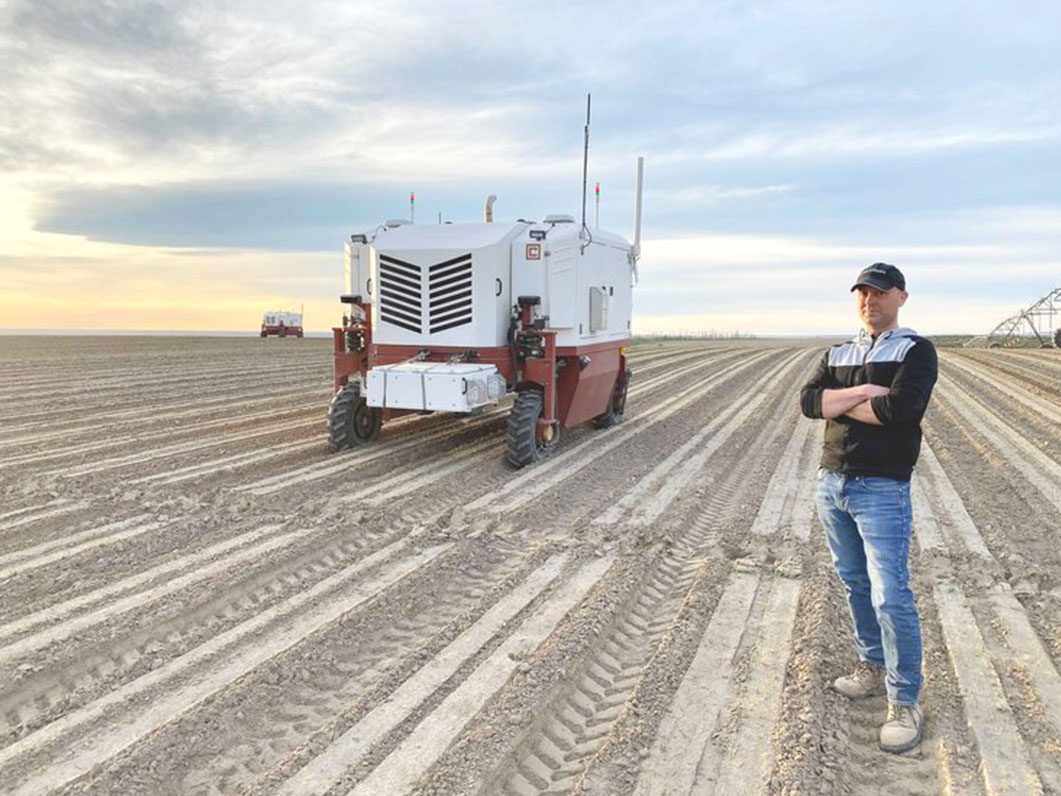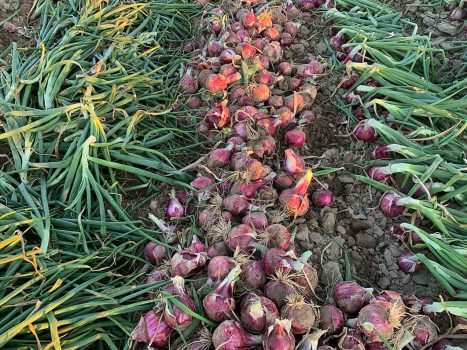Earlier this month Seattle-based AI robotics company Carbon Robotics announced its LaserWeeder™ had been named “Best AI-based Solution for Agriculture” in the sixth annual AI Breakthrough Awards program.
Conducted by AI Breakthrough , a leading market intelligence organization, the award program “recognizes today’s top companies, technologies and products in the global Artificial Intelligence (AI) market.”
As the first and only commercially available laserweeding robot, LaserWeeder™ has eliminated over one billion weeds by leveraging “sophisticated AI deep learning technology, computer vision, robotics and lasers” that provide high precision weed control.
The LaserWeeder can kill up to 99 percent of weeds, weed up to two acres per hour and eliminate up to 5,000 weeds per minute, Carbon Robotics said.
Moreover, the LaserWeeder can operate on over 40 crops and create and deploy new deep-learning crop models within 24 to 48 hours. “Growers utilizing the LaserWeeder have reduced weed control costs by up to 80 percent and see a return on investment in one to three years,” the company added.
Paul Mikesell, CEO and founder of Carbon Robotics, said the use of AI in ag one of the only non-controversial use cases for the technology, explaining, “AI is unlike any other technology, evolving as it processes information and opening a range of new use cases that are hard to predict. However, with agriculture, there are a number of applications that are already positively impacting farmers. AI in agriculture has the potential to streamline operations, improve efficiencies, revolutionize outdated practices and address ongoing labor shortages, consequentially supporting food security for consumers.”
He continued, “For example, weeding hasn’t historically seen many advancements, with growers relying on hand weeding, tilling and herbicides. All of these approaches have been around for decades if not centuries. With advancements in AI, machine learning and computer vision, we have created an entirely new approach to weeding that is sustainable and cost-effective.”
Mikesell cited New Mexico onion grower James Johnson and Carzalia Produce in Columbus as a prime example of the positive impact robotics brings to ag. James uses Carbon Robotics on his farm and said, “This is one of the most innovative and valuable technologies that I’ve seen as a farmer.”
James added, “I expect the robot to go mainstream because of how effectively it addresses some of farming’s most critical issues, including the overuse of chemicals, process efficiency and labor. These robots work with a variety of crops and are autonomous and organic. The sky’s the limit.”
CEO Mikesell said AI lends itself to sustainability as well. “Artificial intelligence is enabling innovation, but we have only begun to scratch the surface of how it can be leveraged in agriculture. We anticipate there to be a number of ways for AI to improve operations and support growers as the technology continues to evolve.
“As these systems capture more imagery, AI will enable organizations to process and analyze data to derive insights, enabling growers to better understand and predict their crop inputs, outputs and seasonal economics. Additionally, AI is now leading to a number of innovations that were not previously possible.”
He went on to say, “For example, without advancements in computer vision and AI, the LaserWeeder wouldn’t be able to identify, target, and kill weeds. Each weed is identified by its specific type and size, and the LaserWeeder applies differential amounts of laser thermal energy required to kill each weed. The advancements in technology and the growing capabilities of AI are enabling new approaches that automate mundane tasks and creating opportunities to innovate more sustainable solutions, such as laserweeding.”
And the sustainability factor not only applies to farmers but also to consumers with its organic certification, he said.
“Laserweeding is a certified organic weeding method that supports improved soil and crop health. Because it can replace herbicides, farmers don’t need to rely on chemicals that can impact long-term soil health and crop quality. The LaserWeeder also reduces the need for tilling, which can affect soil health by disrupting the microbiome and creating groundwater runoff. Dead weeds are reabsorbed into the soil as organic matter.”
This new technology is a game changer. “Until now, growers haven’t had many new alternative weeding methods to choose from,” Paul said. “Now laserweeding offers a completely new, sustainable and organic method that has the potential to replace traditional methods. Laserweeding is a great example of how AI and advancements in technology are enabling innovations that revolutionize a specific task while offering new benefits, such as cost savings, enhanced efficiencies and improved sustainability.”
With regard to the Laser Weeder contributions to improved efficiencies and reduced costs, Paul said, “Its most significant benefits are cost and time savings. It can kill 200,000 weeds per hour, which is equivalent to a 75-person hand-weeding crew.”
And, he said, “After implementing laserweeding technology, farmers have experienced up to 80 percent cost savings in annual weed control. They also see a payback period of one to three years after purchase. This is especially impactful as farm labor and herbicides continue to rise in cost and decrease in availability.”
The upshot, he said, is that “by leveraging automated solutions, farmers will be able to reduce overall operational costs, particularly highly variable costs such as weed management.”
Acknowledging the AI Breakthrough award, Paul said, “Recognizing the challenges farmers face in weed control, we created an AI and deep learning technology that saves growers time and money on an extremely expensive and challenging task. We are honored to receive this recognition from AI Breakthrough and are proud to equip farmers with a reliable and sustainable tool.”
With its mission “to honor excellence and recognize the innovation, hard work and success in various AI and machine learning-related categories, the AI Breakthrough Awards Program drew more than 3,200 nominations this year from over 20 countries worldwide.
AI Breakthrough Managing Director (also named James Johnson) said, “We’re thrilled to award Carbon Robotics’ groundbreaking LaserWeeder ‘Best AI-based Solution for Agriculture.’ The LaserWeeder’s complex computer vision technology enables farmers to manage weed control efficiently.”
“In today’s climate of scarce available labor and low supply of herbicides, growers need solutions that enable them to weed large-scale crops effectively,” he continued. Carbon Robotics is providing that solution through its technology.”
In early 2023 Carbon Robotics introduced a new capability of the LaserWeeder – the industry’s first LaserThinning technology – which targets areas where vegetable crops are purposefully overseeded and then thinned for optimal crop spacing, growth and yield.
The company was also named to Fast Company’s annual list of Most Innovative Companies and raised $35 million in Series C funding to expand sales, optimize and scale manufacturing, develop new products and launch into international markets.


